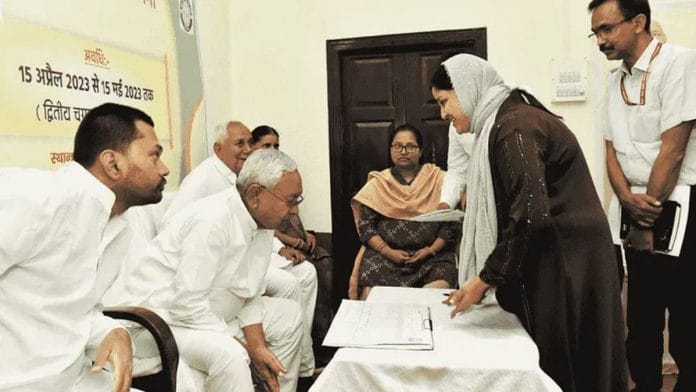In the kaleidoscope of South Asia, known for its digital marvels and innovations, India stands as an enigma—a land of contrasts and contradictions. There’s the state of Bihar, bravely and passionately forging ahead with a caste-based census even in the face of conspicuous hesitance from Prime Minister Narendra Modi’s administration.
In stark contrast, India’s neighbour Pakistan, often seen playing catch-up in the technological race, is boldly embarking on its 2023 digital census. A deep, soul-stirring question thus emerges from this paradox: How can India, the luminary that danced with the stars through its lunar ventures, falter when it comes to leveraging its technological prowess to intimately connect with its own heart—its diverse populace? Poised at the forefront of global technological feats, India is showing restraint in deploying its vast resources to bridge age-old societal divides.
G20 and caste census
If Western democracies and G20 nations can prioritise the leadership and active participation of marginalised communities, ensure equitable resource allocation, and maintain transparency in unveiling governmental agendas, why can’t we uphold and mirror these commendable standards?
To achieve this, India must first possess accurate data on the caste representation of its population. Regrettably, the central government was preoccupied with theatrical spending to impress G20 nations, and it seems to be faltering in this crucial task. That leaves states like Bihar to step up and shoulder the constitutional responsibility.
The discrepancy in priorities becomes starkly evident when one contrasts the grandeur of the G20 summit—devouring a staggering Rs 4,100 crores—with the daily struggles of India’s marginalised. This monumental expenditure inevitably raises probing questions. Are we, as a nation, eclipsing the pressing needs of our citizenry in the luminance of global diplomacy? Could our palpable hesitation in commissioning a national caste-based census be a tactical political manoeuvre potentially concealing the ground realities faced by communities such as the EBC, OBC, SC/ST, and denotified tribes? Under Modi’s leadership, is there an implicit inclination to navigate away from the constitutional commitments towards these vulnerable sections?
Our Constitution, a beacon of democratic ideals, resolutely champions the nuanced allocation of resources, harmonising with the genuine needs of our diverse populace. However, traversing the contemporary political panorama, India seems to be ensnared within an intricate labyrinth of contradictions.
The spectre of burgeoning debts is emblematic of Modi’s era, and perturbingly, the mammoth resource allocation often seems to misalign with our society’s urgent needs at the grassroots.
Also read: Modi govt missed crucial chance to embrace new gen Ambedkarites. Rahul Gandhi has an edge
Australia to Norway
The caste census, a potent instrument for demystifying India’s complex socio-economic fabric, remains overshadowed. This endeavour transcends mere quantitative analysis; it serves as a resonant voice for the voiceless. It will lay the foundation for inclusive governance, and become a repository of the hopes, dreams, and aspirations of millions.
The ongoing discourse in Bihar has illuminated an undeniable axiom: the caste census is paramount for a nation as diverse as ours.
Population surveys across the globe serve as an indispensable instrument for nations to grasp the distinct identities and necessities of their indigenous and ethnic groups. Countries such as Australia, Canada, and New Zealand conduct a census every five years, while Brazil, Indonesia, Mexico, and several others have a 10-year interval. Rooted in each nation’s legislative frameworks, they resonate deeply, encompassing communities from Australia’s Aboriginal people and Torres Strait Islanders to Brazil’s Yanomami and New Zealand’s Maori population.
The Native Title Act 1993 in Australia, the Indian Act 1876 in Canada, and the Treaty of Waitangi 1840 in New Zealand are just a few of the many laws safeguarding the rights of these communities. Chile, Colombia, Indonesia, and Mexico, among others, have their own set of legal frameworks ensuring the preservation of rights, traditions, and identities.
While the Maori in New Zealand find their heritage protected by the Treaty of Waitangi, the Sámi in Norway lean on the Finnmark Act 2005. These surveys, shaped by laws and constitutions, not only quantify but also validate the existence, identity, and aspirations of these groups. China and South Africa too have similar mechanisms or policies in place.
Also read: Caste census politics — what Bihar thinks today, Bihar used to think day before yesterday
A pressing issue
Standing at a critical nexus between a glorious historical tapestry and a future brimming with potential, India faces a moment of unparalleled significance. Global precedents, extend an inviting hand, urging us to heed their insights. Prime Minister Modi, the nation’s heartbeat reverberates with a mix of hope, anticipation, and an insatiable thirst for transformative strides under your aegis.
The clarion call from India’s vast population is undeniable. It’s time for significant changes Foremost in this metamorphosis should be the immediate and thorough execution of a caste-based census.
It will mend the chasms that history has etched deep into our societal fabric. With many nations across the globe effortlessly integrating state-of-the-art technology into their demographic undertakings, India should not lag behind.
True democracy thrives when it resonates with the myriad harmonies of its populace, ensuring that every whisper is heard, every pulse is felt, and every shadow is illuminated. Against a milieu that bears witness to rising caste tensions and widening socio-economic disparities, the call for a comprehensive caste census becomes more pressing. As the collective spirit of our great nation stirs, it resonates not merely as a gentle nudge towards introspection, but as a passionate, fervent plea for decisive action, unwavering dedication, and an accurate reflection of the diverse mosaic that defines the Indian demographic.
The author is the president of Foundation for Human Horizon, an UN-affiliated NGO that’s
leading the Anti-Caste legislation movement in the USA and an Artificial Intelligence (AI)
Research Scholar at Johns Hopkins University. Views are personal.
(Edited by Ratan Priya)






